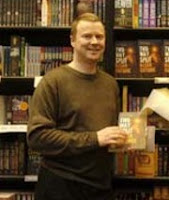
‘Jack Taylor’, the pilot for the movies based on Ken Bruen’s THE GUARDS, screened last night on TV3, and I have to say - reluctantly - that I don’t buy Iain Glen (above, left) in the lead. It doesn’t help that his faux-Irish accent wanders all over the map, but that’s not the biggest problem.
The script, and particularly in the voice-overs, makes something whimsical of Jack Taylor’s fatalism. In the movie, Jack Taylor is a broth of a boy, prone to the odd eye-twinkle, a tough man to deal with if you push him too hard.
In the novels, or in my reading of them at least, Jack Taylor is a dangerous bastard to know, a man fuelled on anger and Jameson, a man who is as hard as only the truly brittle can be, who know that just one more shove or punch or insult could shatter the façade.
It also doesn’t help that the movie, being a movie, needed to make of THE GUARDS a straightforward narrative of investigation, whereas the novel, and all the Taylor novels, are a post-modern take on the detective story, for the most part philosophical ruminations occasionally linked by the need to have some investigative narrative.
I suppose the difference is that, in the movie, Jack Taylor was investigating a series of crimes, rather than investigating Galway itself as a microcosm of the new Ireland.
There was a lot to like, it has to be said, not least of which was the depiction of Galway city, and there were some good performances in the minor roles.
 And hey, maybe Iain Glen has the chops to convince an audience that isn’t familiar with the Bruen novels. Fans, though, will be disappointed, I think. For some promo vids, and to make up your own mind, clickety-click here …
And hey, maybe Iain Glen has the chops to convince an audience that isn’t familiar with the Bruen novels. Fans, though, will be disappointed, I think. For some promo vids, and to make up your own mind, clickety-click here …Meanwhile, it’s been a busy week for Irish crime fiction. Staying with TV3, the ever-radiant Alex Barclay was on the Ireland AM couch, talking up her latest offering, TIME OF DEATH. The conversation includes a very nice shout-out to John Connolly and Declan Hughes - clickety-click here for more …
Staying with Declan Hughes … I don’t know if you could call Emma Donoghue’s new novel, ROOM, a crime novel, even though it concerns itself with some rather despicable criminal activity, but Squire Hughes was suitably impressed when reviewing it for the Irish Times. All the details are here …
Staying with reviews: the eagle-eyed Maxine Clarke has organised her reviews by country over at the Petrona blog, and her introduction to her Irish reviews cites Gene Kerrigan, Brian McGilloway, Alan Glynn and, erm, yours truly. But don’t let that put you off - there’s some really good stuff just about here …
 Elsewhere, Peter Rozovsky reviews Declan Hughes’ latest, CITY OF LOST GIRLS, while the good word has already started to tumble in for Stuart Neville’s COLLUSION …
Elsewhere, Peter Rozovsky reviews Declan Hughes’ latest, CITY OF LOST GIRLS, while the good word has already started to tumble in for Stuart Neville’s COLLUSION …Finally, and veering off the straight-and-narrow of crime fiction, congrats to all who were responsible for having Dublin declared a UNESCO City of Literature last week; and congrats too to Irish scribes Emma Donoghue and Paul Murray, both of whom were long-listed for the Booker Prize, for ROOM and SKIPPY DIES respectively.
Nice work, folks. Very nice indeed …















